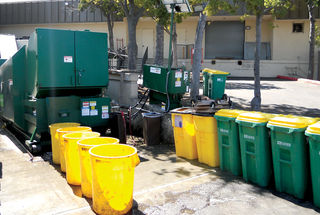Hotel Waste Management: How to Make It More Efficient


The hospitality industry is one of the business niches that is accounted for the most waste generated all over the world. From an operational point of view, it shouldn't surprise anyone, since guests tend to spend resources at a high rate, while hotels need to keep their spaces clean 24 hours seven days a week. While not much thought was given to this problem in the past, today's corporate green initiatives and constantly evolving green technologies have made waste management an important aspect of the hotel industry. Let's analyse the effective ways of streamlining waste management in hotels.
Modify operational habits
The daily operation of your hotel provides you with an excellent testing ground for some of the waste management techniques. Reducing the amount of waste begins with modifying small things, such as switching to refillable dispensers for cleaning products in every room. Using china and dishware to serve meals instead of disposable plates not only elevates your hospitality style but also reduces the waste. Instead of selling bottled water, install water filters on every floor, and avoid paper products other than toilet paper in the bathrooms. Using LED bulbs instead of regular ones automatically means fewer replacements since LED bulbs last up to 10 times longer.
Adopt waste classification
Besides changing the operational habits, classification of waste is probably the most important phase directed to better waste management. The recycling principles are based on preventive measures that include minimizing waste, reusing what can be reused, recovery of useful materials and the way the actual waste is disposed of. Your hotel staff should learn all of these steps as a policy you enforce to reduce the pointless use or resources. Whatever you invest in waste classification and recycling, will return with an interest in the long run.
One size doesn't fit all
For a long time, I've used to deposit the hotel waste in municipal dumpsters which didn't always suit the purpose. The amount of waste generated in hotel industry varies, and on some days the amount equals the whole week. It's become clear to me that standard rubbish removal service is highly inefficient for hotels, and I've started looking for an alternative, a private waste removal contractor with the capacity and manpower to remove the waste as soon as it accumulates. For instance, these guys offering skip bins in Hawkesbury have special containers in different sizes, which lets you choose the ideal capacity for your hotel business.
Re-evaluate disposal habits
At a time, waste disposal was based on sending the generated waste to landfills, where it was incinerated or compacted by rubbish disposal companies. These days, however, you can take an active role in managing at least some part of the process. Since food waste is a single largest waste stream in a hotel, invest in food composters and reduce the binned waste generated by food leftovers. On the other hand, if your hotel business generates a lot of solid waste, purchase a waste compactor and make the rubbish disposal more cost-effective by using smaller skip bins or having them removed fewer times a week.
Make some profit out of it
While not many business owners and hotel managers are aware of this, you can sell your generated waste for profit, provided that you follow the basic rules for recycling certain types of material such as PET, paper, aluminium or glass. Contact local companies that use those types of waste and see if they can solve your problem while you're solving theirs. If you succeed in making it a sustainable project, what training your employees received in waste management will pay off even sooner.
The measures taken by hospitality operators and property managers are mostly centred on changing certain habits of hotel employees. On the other hand, micro investments such as reusable dishware, more efficient dispensers, and longer-lasting expendables are changing the way hotels provide certain services. For some hotel managers, waste disposal has even become an opportunity instead of a nuance. If you are willing to do some research on the recyclable materials in demand in your area and have the manpower and logistics to realise it, you can even make some profit out of your waste.